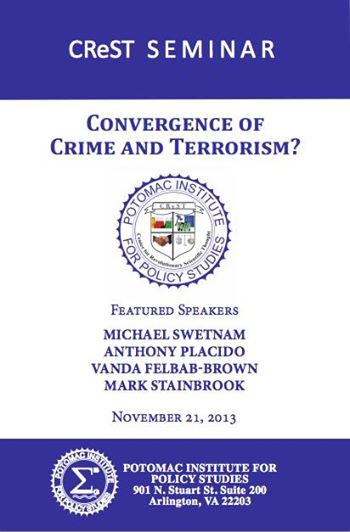Crime and Terror are not Monolithic but are Inextricably Linked
 The growing nexus between gangs and terrorism has resulted in a unique type of threat. Since the 1980s, evidence of narcotics trade has been linked to terrorism and transnational organized crime.
The growing nexus between gangs and terrorism has resulted in a unique type of threat. Since the 1980s, evidence of narcotics trade has been linked to terrorism and transnational organized crime.
The “Convergence of Crime and Terrorism?” seminar was held at the Potomac Institute on Nov. 21, 2013. The seminar centered on the concept that criminal activity and international security are related. Drawing from personal experiences in law enforcement, federal government, and academia, the three panelists evidenced the ways in which crime and terrorism are linked and how law enforcement can stem this issue. The report is available for download.
Experts from law enforcement, Drug Enforcement Agency and Security and Intelligence backgrounds discussed the links between criminal activity and groups with terrorist acts and organizations; the political and economic effects of crime and terrorism on a national level; the need for policy to put distance and separation between the worst criminal groups and the worst terrorist organizations; and the similar characteristics and motivations that drive individuals to join criminal and terrorist groups.
Operating without borders and in areas of government instability, Latin American gangs, such as MS-13, and Mexican cartels have been financing terrorist operations through the drug trade. In the United States, Los Angeles gangs have been linked to Hezbollah and Minnesota groups have been linked to Al-Shabaab. Narco-trafficking is a lucrative business and terrorist organizations such as the FARC, Hezbollah, and al-Qa'ida take advantage of this black market.
In sum, it is not accurate to describe transnational organized crime and terrorism as monolithic; yet it is known that they are inextricably linked. All three panelists provided various methods for dealing with this pressing issue.
Mr. Placido (Principal, Booz Allen Hamilton and Former Assistant Administrator for Intelligence, Drug Enforcement Agency) argued that there is not a one size fits all approach, but that targeting the infrastructure of transnational organized crime can be effective. Dr. Felbab-Brown (Senior Fellow, Foreign Policy, Center for 21st Century Security and Intelligence, Brookings Institution) believes that the goal is to import the image of a “good” criminal, a criminal that does not collaborate with terrorists, is not very violent, is removed from society, and is without the capacity to corrupt institutions. Concluding the seminar, Mark Stainbrook (Assistant Chief, San Diego Harbor Police) stated that the goal of law enforcement is long-term prevention rather than detection, and that there exists a need to implement community-based police strategies.
